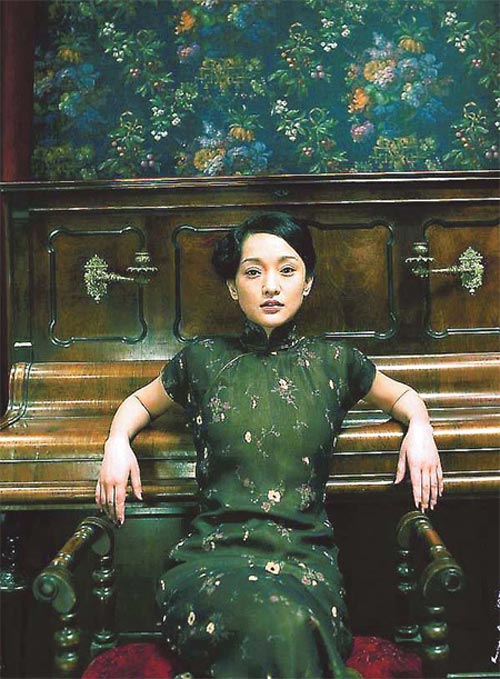Cinema paradiso what happens when nostalgia meets reality
 |
|
Zhou Xun is one of the most accomplished talents in Chinese cinema today. [Source: China Daily] |
The metamorphosis of the feminine image in Chinese cinema was well and truly on its way.
But like all actresses her generation, Gong Li and her contemporaries were classically grounded in textbook acting. In spite of changing appearances, their ability to draw from real-life emotions and experiences still mirrored the times they were living in, which was a lot more austere in mental and material temptations compared to now, Jiang observed.
Ironically, it is this "purity and simplicity" that Zhang Yimou and his cohort are looking for now. But once the changes begin, there can be no holding back, and their search will only get harder and harder, and ultimately, it may even be futile.
"When we look back at these actresses, we can't help but think how rustic they were," says China Daily columnist and film critic Raymond Zhou, a long-time observer of the changes in Chinese cinema. "The actresses these days are noticeably more sophisticated and trendy."
They are more world-wise as well, in order to cope with the increasingly sophisticated environment in which they have to hone their skills and eke a living.
The aesthetic appreciation of movie-ticket buyers has shifted in tandem and they now want their on-screen heroines to look a lot more like international screen icons from say, Hollywood.
Zhou also points out that audiences these days are more diversified, with differing tastes and definitions of beauty.
"Like Zhang Ziyi, Zhou Xun, Zhao Wei and Xu Jinglei," Zhou says, describing the four leading actresses of the day. "They each have distinctive looks and styles." And therefore, different fan bases.
Zhang Ziyi exploited her potential with a dramatic debut in Zhang Yimou's rustic romance The Road Home. Later, she would shed her pigtails and steal the limelight with her supporting role in Ang Lee's Oscar-winning Crouching Tiger Hidden Dragon.
Zhou Xun, coming after Zhang Ziyi, has often been described as the best actress of her generation, being able to carry an entire movie on her own like the much-lauded Painted Skin.
The big-eyed Zhao Wei, launched to fame by her cheeky portrayal of a vagabond maid turned royalty in the monster hit Taiwanese television series Princess Pearl, is appreciated for her excellent comic timing and her colorful personality. She successfully established footholds on both sides of the Straits in Hong Kong and Taipei.
Xu Jinglei, known for her versatility on screen and her ambitions as a director, is equally respected for her business acumen. She has adapted to various screen roles with the ease of a chameleon, taking it even further by getting behind the camera with a successful crossover to directing.
And so, actresses no longer serve as inaccessible image icons fuelling the fantasies of moviegoers.
They are now flesh-and-blood celebrities who build fame on personality as much as acting ability. Their private lives commandeer the headlines of the penny press as much as any Hollywood superstar.
With such a galaxy of stellar talent to pick from, why then are some directors lamenting the loss of innocence? Why is it so hard to find? According to Jiang Xiaoyu, it all boils down to a very practical reason. The talent pool is getting clichd.
"Students from grassroots families across China are finding it harder to gain admission into major performing and arts colleges due to stringent recruitment procedures and escalating costs.
"This means those who can afford admission are mainly from the big cities or affluent families. They are urban children and they do not have the rustic innocence of the countryside that directors are looking for. Nor do they have the memories of suffering under the 'cultural revolution'(1966-76) or the times of hardship and famine," Jiang says.
Zhou Xun, coming after Zhang Ziyi, has often been described as the best actress of her generation, being able to carry an entire movie on her own like the much-lauded Painted Skin.
The big-eyed Zhao Wei, launched to fame by her cheeky portrayal of a vagabond maid turned royalty in the monster hit Taiwanese television series Princess Pearl, is appreciated for her excellent comic timing and her colorful personality. She successfully established footholds on both sides of the Straits in Hong Kong and Taipei.
Xu Jinglei, known for her versatility on screen and her ambitions as a director, is equally respected for her business acumen. She has adapted to various screen roles with the ease of a chameleon, taking it even further by getting behind the camera with a successful crossover to directing.
And so, actresses no longer serve as inaccessible image icons fuelling the fantasies of moviegoers.
They are now flesh-and-blood celebrities who build fame on personality as much as acting ability. Their private lives commandeer the headlines of the penny press as much as any Hollywood superstar.
With such a galaxy of stellar talent to pick from, why then are some directors lamenting the loss of innocence? Why is it so hard to find? According to Jiang Xiaoyu, it all boils down to a very practical reason. The talent pool is getting clichd.
"Students from grassroots families across China are finding it harder to gain admission into major performing and arts colleges due to stringent recruitment procedures and escalating costs.
"This means those who can afford admission are mainly from the big cities or affluent families. They are urban children and they do not have the rustic innocence of the countryside that directors are looking for. Nor do they have the memories of suffering under the 'cultural revolution'(1966-76) or the times of hardship and famine," Jiang says.
 0
0 






